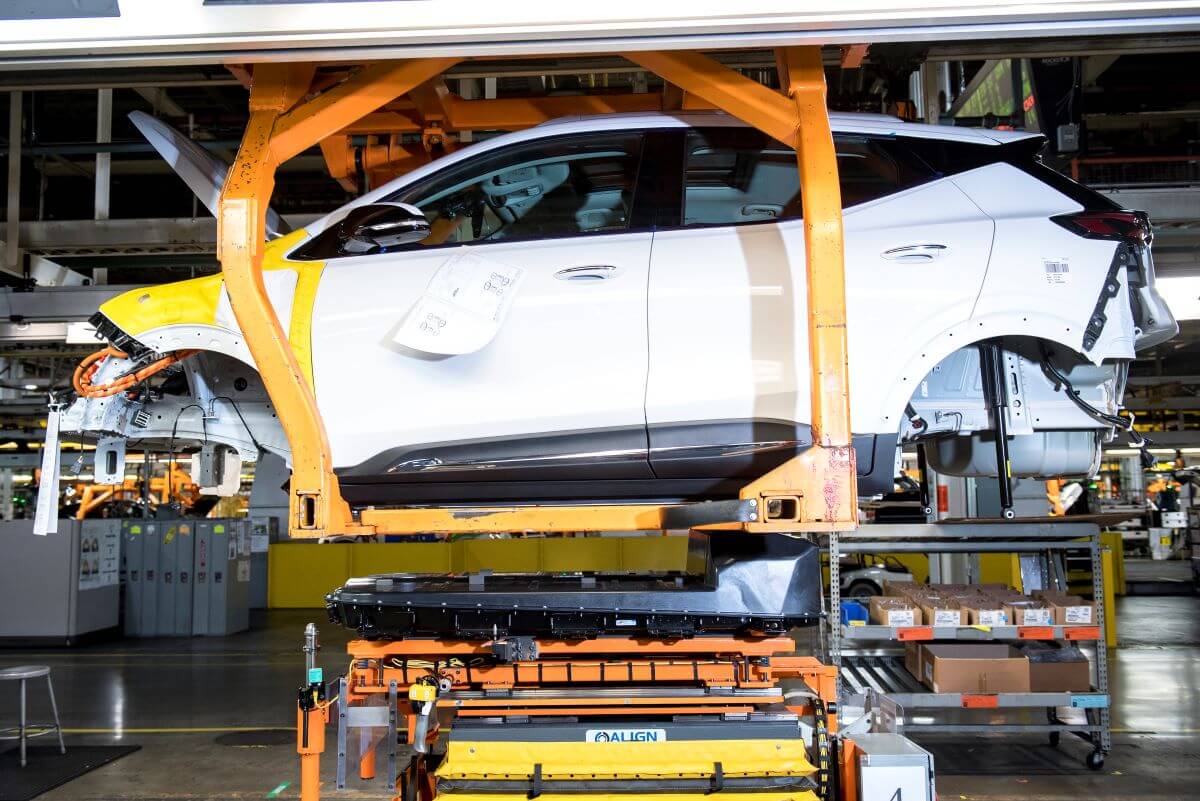Car Dealerships Push Back Against Mandatory EV Sales

Table of Contents
Financial Hurdles Faced by Dealerships in Transitioning to EVs
The shift towards electric vehicles presents significant financial challenges for car dealerships. Adapting to this new landscape requires substantial investment and carries inherent risks.
High Upfront Investment Costs for EV Infrastructure
Transitioning to EV sales necessitates significant upfront investments. Dealerships face substantial costs associated with:
- Charging station installation: Installing and maintaining a network of charging stations requires considerable capital expenditure. The cost varies based on the number of chargers, their power capacity, and any necessary grid upgrades.
- Specialized EV mechanic training: Servicing electric vehicles requires specialized knowledge and training. Dealerships must invest in training their mechanics to handle EV-specific repairs and maintenance. This includes learning about high-voltage systems, battery technology, and specialized diagnostic tools.
- Inventory management for EVs: Managing EV inventory presents unique challenges. EVs often require more sophisticated storage solutions to protect their batteries and charging systems. Furthermore, the potential for slower sales of EVs compared to gasoline vehicles introduces inventory risk.
These upfront costs place a significant financial burden on dealerships, particularly smaller independent ones, potentially hindering their ability to invest in other crucial areas of their business.
Reduced Profit Margins on Electric Vehicle Sales
Dealerships also face reduced profit margins on electric vehicle sales compared to traditional gasoline-powered cars. Several factors contribute to this:
- Lower servicing revenue for EVs: Electric vehicles have fewer moving parts than gasoline cars, leading to less frequent and less complex maintenance requirements. This translates to reduced service revenue for dealerships.
- Increased competition in the EV market: The EV market is becoming increasingly competitive, with established automakers and new entrants vying for market share. This competition can pressure profit margins.
The lower profitability of EV sales directly impacts the financial viability of dealerships, especially if they are heavily reliant on service revenue to support their operations.
Lack of Consumer Demand in Certain Regions
Consumer demand for electric vehicles is not uniform across all geographic regions. Several factors limit adoption in some areas:
- Geographic limitations (charging infrastructure, range anxiety): The lack of widespread charging infrastructure and concerns about range anxiety deter potential buyers in many regions.
- Higher purchase prices: The higher initial purchase price of EVs compared to gasoline cars remains a barrier for many consumers.
- Consumer hesitancy: Some consumers remain hesitant to adopt EVs due to unfamiliarity with the technology, concerns about battery life, and perceived limitations in performance or features.
This uneven distribution of demand disproportionately affects dealerships located in areas with limited EV infrastructure or lower consumer interest, leaving them struggling to meet mandatory EV sales quotas.
Concerns Regarding Government Mandates and Lack of Flexibility
Many dealerships express concerns about the rigidity of government mandates for mandatory EV sales and the lack of flexibility offered.
Rigid Quotas Disregard Regional Differences in Market Readiness
Blanket mandates for mandatory EV sales fail to consider the varying levels of market readiness across different regions.
- Varying levels of consumer adoption: Consumer acceptance of EVs varies significantly based on factors like income levels, access to charging infrastructure, and awareness of government incentives.
- Differences in charging infrastructure development: The development of charging infrastructure is uneven across the country. Some regions have significantly more charging stations than others.
- Regional economic factors: Economic conditions in different regions influence consumer purchasing power and willingness to adopt new technologies.
Ignoring these regional differences makes it difficult, if not impossible, for dealerships in less-ready markets to comply with the mandates.
Insufficient Government Support for Dealership Adaptation
Government mandates should be accompanied by sufficient support to enable dealerships to adapt effectively. Currently, this support is often lacking.
- Lack of subsidies or grants for infrastructure improvements: Dealerships often receive limited financial assistance for installing charging stations and upgrading their facilities.
- Insufficient training programs: Government-funded training programs for EV mechanics are often inadequate to meet the growing demand.
The Potential for Decreased Sales and Business Closures
Aggressive mandates without adequate support could lead to decreased sales and even business closures for some dealerships.
- Financial strain from meeting quotas: The financial pressure to meet mandatory EV sales quotas can strain dealerships' resources, especially if they lack sufficient consumer demand or financial support.
- Potential for dealership closures if unable to meet demands: Dealerships unable to meet the quotas risk facing financial penalties or even closure, jeopardizing jobs and harming local economies.
Proposed Solutions and Alternative Approaches
A more collaborative and supportive approach is needed to ensure a successful transition to electric vehicles without unduly harming car dealerships.
Phased Implementation of EV Sales Mandates
A phased implementation of EV sales mandates would allow dealerships to adapt gradually.
- Gradual increase in quotas over a longer timeframe: A gradual increase in quotas over several years would give dealerships time to adjust their infrastructure, training, and inventory management practices.
Increased Government Support and Incentives
Significant government support and incentives are crucial for a smooth transition.
- Financial assistance for infrastructure upgrades: Governments should provide generous subsidies and grants for dealerships to install charging stations and upgrade their facilities.
- Subsidies for consumer EV purchases: Increased subsidies for consumers to purchase EVs would stimulate demand and help dealerships meet their quotas.
- Educational campaigns: Public awareness campaigns could educate consumers about the benefits of EVs, addressing concerns about range anxiety and other barriers to adoption.
Collaboration Between Government, Manufacturers, and Dealerships
A collaborative approach involving all stakeholders is essential.
- Joint planning and strategy: Government agencies, auto manufacturers, and dealerships should collaborate to develop a comprehensive plan for EV adoption that considers the concerns of all parties.
- Information sharing: Open communication and information sharing would help address the challenges and facilitate a smoother transition.
- Cooperative initiatives: Joint initiatives could focus on training programs, infrastructure development, and marketing campaigns to promote EV adoption.
Conclusion: Navigating the Future of Car Sales with EVs
The transition to electric vehicles presents significant challenges for car dealerships. Mandatory EV sales quotas, without sufficient financial support and a flexible implementation strategy, risk harming the viability of dealerships and potentially hindering the broader adoption of EVs. Addressing the financial hurdles, concerns regarding inflexible government mandates, and fostering collaboration between all stakeholders are crucial for navigating this transition successfully. Understanding the complexities surrounding mandatory EV sales is crucial. Let's work towards a future where electric vehicles flourish without jeopardizing the livelihoods of car dealerships and their employees. Join the conversation and advocate for responsible EV adoption policies that support both environmental sustainability and economic viability.

Featured Posts
-
 Paris Roubaix Bottle Throwing Spectator Surrenders To Police
May 26, 2025
Paris Roubaix Bottle Throwing Spectator Surrenders To Police
May 26, 2025 -
 Thierry Ardisson Et Laurent Baffie Fin D Une Amitie Connerie Et Machisme Au C Ur Du Probleme
May 26, 2025
Thierry Ardisson Et Laurent Baffie Fin D Une Amitie Connerie Et Machisme Au C Ur Du Probleme
May 26, 2025 -
 French Open Alex Eala Aims For Successful Start
May 26, 2025
French Open Alex Eala Aims For Successful Start
May 26, 2025 -
 Alexandra Eala Paris Grand Slam
May 26, 2025
Alexandra Eala Paris Grand Slam
May 26, 2025 -
 Hugo De Waha Remporte La Bourse Payot 2023
May 26, 2025
Hugo De Waha Remporte La Bourse Payot 2023
May 26, 2025
